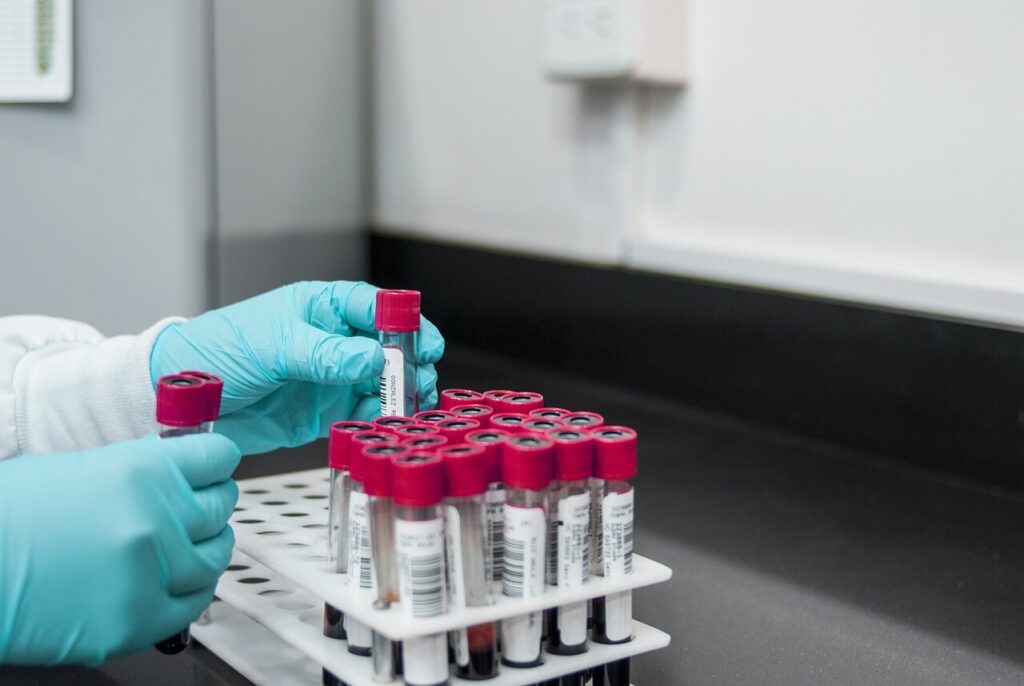Noticing clumps of hair in your shower drain? Or feel like you’re dragging yourself through your day? Hashimoto’s Disease could be to blame.
Hashimoto’s thyroiditis is an autoimmune disease that affects 1 in 20 Americans. It’s the leading cause of hypothyroidism in the US.
Even so, many people suffer for years before getting a Hashimoto diagnosis due to inadequate testing.
But it doesn’t need to be this way. In this article, we’ll cover common signs of Hashimoto’s, how to test (the right way), and how functional medicine approaches treatment.
What is Hashimoto’s Disease?
Hashimoto’s thyroiditis is an autoimmune disease where the immune system attacks the thyroid gland. It’s also known as chronic lymphocytic thyroiditis or autoimmune thyroiditis.
Typically, your immune system protects your body from harmful pathogens like viruses and bacteria. But in Hashimoto’s disease, the immune system goes rogue and attacks the thyroid gland instead.
This damages the thyroid, affecting its ability to produce enough thyroid hormone. Over time this can lead to hypothyroidism, also known as an underactive thyroid.
Like all autoimmune diseases, there’s no cure for Hashimoto’s. But with the right treatment, it can go into remission. More on this later…
Hashimoto’s vs Hypothyroidism: What’s the Difference?
Hypothyroidism is a blanket term for an underactive thyroid gland, which causes the body to not produce enough thyroid hormone.
Hashimoto’s disease is a type of autoimmune disease where the immune system attacks the thyroid gland by mistake. Eventually, as the disease progresses, this can lead to hypothyroidism.
In Hashimoto’s thyroiditis, the body produces antibodies like anti-thyroid peroxidase (anti-TPO) and anti-thyroglobulin (anti-Tg) antibodies. These antibodies aren’t present in non-autoimmune hypothyroidism.
What Symptoms Does Hashimoto’s Cause?
Your thyroid hormone controls your metabolism, helping your body convert food into energy. All your body’s organs depend on this energy to function.
So when your thyroid hormone is low – which is the case in Hashimoto’s – it can have far-reaching effects on every organ system in your body.
Symptoms of Hashimoto’s disease may include:
- Goiter (or bulging in the neck)
- Fatigue
- Dry skin
- Sensitivity to cold
- Constipation
- Reduced sex drive
- Heavy or irregular periods
- Infertility
- Depression
- Weight gain
- Hair loss
- Joint pain
- Muscle aches
- Brain fog
- Slow heart rate
Because symptoms run the gamut, Hashimoto’s is often mistaken for other illnesses. These include depression, fibromyalgia, chronic fatigue syndrome, and lupus.
Keep in mind – everyone is unique. Some people with Hashimoto’s start off without any symptoms at all. Typically, as the disease progresses and thyroid hormone declines, symptoms start to emerge.
In the beginning stages of the disease, sometimes thyroid damage can cause the thyroid to release too much thyroid hormone. While rare, this can lead to symptoms of hyperthyroidism temporarily.
Risk Factors for Hashimoto’s
Here are a few things that can increase your risk of developing Hashimoto’s:
- Sex – Women are 10 times more likely to get Hashimoto’s than men.
- Age – Hashimoto’s is usually diagnosed between the ages of 30 to 50. But it can occur in younger people too.
- Genetics – If you have a family history of Hashimoto’s, you’re more likely to develop it.
- Autoimmune disease – Having another autoimmune disease such as diabetes, arthritis, or celiac disease increases your risk of Hashimoto’s.
What Triggers Hashimoto’s Flare-ups?
Like all autoimmune diseases, Hashimoto’s thyroiditis can cause flare-ups. Sometimes called relapses or episodes, these are periods when symptoms intensify, or new ones pop up.
Many physical, emotional, and environmental factors can lead to Hashimoto’s flare-ups, including:
- Hormonal imbalances
- Food sensitivities
- Stress
- Lack of sleep
- Viral infections, such as Epstein Barr
- Medications and supplements
- Toxin exposure (heavy metals, chemicals, pesticides, etc.)
Getting the right testing can help identify any underlying factors that may be contributing to flare-ups.
Hashimoto’s Diagnosis: What to Test
Hashimoto’s disease takes years to develop. Yet many people struggle with symptoms for far too long before getting a diagnosis.
This is because many conventional doctors only test thyroid-stimulating hormone (TSH). As the name suggests, this hormone prompts your thyroid gland to make more thyroid hormone. If TSH is high, it means your thyroid hormone is low.
However, many people with Hashimoto’s don’t have low TSH until the later stages of the disease. And by then, your thyroid gland will have sustained some damage.
The solution? Get a complete thyroid panel. This can save you years of frustration and prevent further thyroid damage.

At Anchored in Health, our functional medicine doctor uses the following tests:
- TSH (thyroid-stimulating hormone)
- Total T4 (thyroxine)
- Free T4
- Total T3 (triiodothyronine)
- Free T3
- Reverse T3
- Thyroid peroxidase antibody (TPOAb)
- Thyroid globulin antibody (TgAb)
Be aware, many doctors only order more tests if your TSH is off. That’s why it’s important to be your own advocate and ask for more. If your doctor says no, it may be time to find a new one! To learn more about these tests, check out this post.
If thyroid antibodies show up, that’s a surefire sign of Hashimoto’s. If you have thyroid antibodies, but your other thyroid hormones are normal, you’re early in the disease.
This is good news! It means your thyroid hasn’t been damaged enough to disrupt your thyroid hormones. Adjusting your lifestyle may help prevent the disease from progressing further.
Sometimes more testing is needed to find other underlying triggers. This varies depending on the individual’s health history and symptoms but may include:
- Stool testing to identify parasites, yeast overgrowth, or bacterial imbalances
- Celiac or gluten intolerance testing
- Hormone testing
- Organic acids testing (OAT) to check for vitamin and mineral deficiencies
- Environmental toxin testing
How Does Functional Medicine Treat Hashimoto’s Disease?
Hashimoto’s is traditionally treated with synthetic thyroid hormone (levothyroxine). While helpful, this drug needs to be closely monitored and can cause many side effects. Luckily, there is another option…
Functional medicine treats Hashimoto’s disease by addressing the root cause of autoimmunity.
This will be different for everyone, but some common culprits are:
- Food sensitivities
- Chronic infections
- Toxin exposure
- Leaky gut
- Hormone imbalances
When these underlying triggers are addressed, remission is possible. Treatment involves dietary and lifestyle changes to calm the autoimmune response and bring your body in balance.
Diet
Inflammation is a major trigger in autoimmunity – and diet is often a huge cause of inflammation. That’s why changing your diet can go a long way in reducing Hashimoto’s symptoms.

Here are a few dietary habits that may help calm the autoimmune response:
- Keep your blood sugar balanced. Blood sugar imbalances can trigger Hashimoto’s flares, so stabilizing your blood sugar is key. Avoid sweets, refined carbs, and foods with added sugars to help keep your blood sugar stable.
- Limit high iodine foods. Excess iodine can worsen hypothyroidism in patients with Hashimoto’s. In one study, 78% of Hashimoto’s patients regained normal thyroid function simply by limiting high-iodine foods! Sources of iodine include iodized table salt, processed foods with iodized salt, seaweed, dairy, and supplements.
- Go gluten-free. Celiac disease and gluten sensitivities are common among people with Hashimoto’s. And there’s evidence that following a gluten-free diet can reduce thyroid antibodies.
- Try an elimination diet. Sometimes nixing gluten isn’t enough if other food sensitivities are at play. Elimination diets involve avoiding certain foods for a period of time, and then adding them back one by one to see if they trigger symptoms. This can help you pinpoint any foods that are causing problems. Two elimination diets to consider are the Paleo diet and Autoimmune Paleo (AIP) diet. They’re both shown to ease Hashimoto’s symptoms.
- Follow the Mediterranean diet. Some research shows that the Mediterranean diet may protect the thyroid from inflammation. The Mediterranean diet is filled with wholesome, nutrient-dense foods like legumes, whole grains, vegetables, fruits, olive oil, and fish.
Keep in mind, there’s no one-size-fits-all Hashimoto’s diet. Everyone’s triggers are unique. To find which diet works best for you, you’ll need to experiment.
Lifestyle
Shifting your lifestyle is also a must for calming autoimmunity. Here are some lifestyle habits that may tame Hashimoto’s symptoms:

- Move your body. Exercise lowers inflammation, boosts your mood, and relieves stress, which all benefit Hashimoto’s. Aim for 150 minutes of exercise each week. If you’re having symptoms, it’s best to start with low-impact exercises like yoga, walking, and swimming.
- Get plenty of sleep. Not getting enough sleep causes inflammation and throws off your hormones. Studies show people who sleep less than 7 hours a night face a higher risk of hypothyroidism. So aim to get 7-8 hours of shut-eye every night.
- Live a low-tox lifestyle. Many personal care products contain endocrine-disrupting chemicals that affect thyroid function. To limit toxin exposure, choose natural personal care and cleaning products. Check out EWG’s Skin Deep database if you need help finding safer products.
- Dial down stress. Your thyroid and adrenals work in tandem. So when you’re stressed, your thyroid function suffers. Keep your stress in check by making time for daily relaxation. Meditate, get out in nature, journal, do some yoga, or try breathwork.
Nutritional supplements
While diet and lifestyle are vital to treating Hashimoto’s holistically, nutritional support can also help.
Many nutritional deficiencies are common among patients with Hashimoto’s including:
- Vitamin D
- Selenium
- Zinc
- Magnesium
- Vitamin B1 (thiamine)
- Vitamin B12
- Iron
Addressing these deficiencies through diet or supplementation may help relieve symptoms.
In addition, excess cortisol can weaken thyroid function. So adrenal support is often needed to treat Hashimoto’s.
Treat Hashimoto’s Holistically with Functional Medicine in Orland Park, IL
If you live in the Chicago area and suspect you have Hashimoto’s – but want a holistic approach to treatment, Anchored in Health is here to help.
Our functional medicine doctor does a complete thyroid panel and thorough health history to get to the root of what’s causing your symptoms.
From there, you get a customized treatment plan, with dietary, lifestyle, and supplement recommendations to help calm inflammation and bring your body back into balance.
Ready to find the root cause of what’s triggering your symptoms? Click here to book your appointment now.
Other Holistic Health Services Offered at Anchored in Health in Orland Park, IL
At Anchored in Health, functional medicine isn’t all we do. We offer a wide variety of wellness services to support your health and well-being. This includes chiropractic care, acupuncture, massage therapy, and the Shape ReClaimed program. We also offer genetic testing and thermography as well. Contact us to learn more about how we can support you in living your healthiest, happiest life!
Disclaimer: The information provided on this blog is for educational and informational purposes only and is not intended to diagnose, treat, cure, or prevent any disease. The content is not a substitute for professional medical advice, diagnosis, or treatment. Always seek the guidance of a qualified healthcare provider with any questions you may have regarding your health or a medical condition.
Reading this blog does not establish a doctor-patient relationship between you and Anchored In Health or any of its practitioners. Reliance on any information provided in this blog is solely at your own risk. For medical concerns, always consult a licensed healthcare provider.
References
- https://www.niddk.nih.gov/health-information/endocrine-diseases/hashimotos-disease
- https://www.ncbi.nlm.nih.gov/books/NBK500006/
- https://www.ncbi.nlm.nih.gov/books/NBK459262/
- https://pubmed.ncbi.nlm.nih.gov/12728462/
- https://www.mayoclinic.org/drugs-supplements/levothyroxine-oral-route/side-effects/drg-20072133
- https://scholarworks.arcadia.edu/cgi/viewcontent.cgi?article=1081&context=showcase
- https://www.ncbi.nlm.nih.gov/pmc/articles/PMC6592837/
- https://www.ncbi.nlm.nih.gov/pmc/articles/PMC6592837/
- https://pubmed.ncbi.nlm.nih.gov/32729374/
- https://pubmed.ncbi.nlm.nih.gov/31752113/
